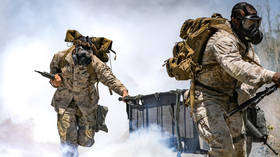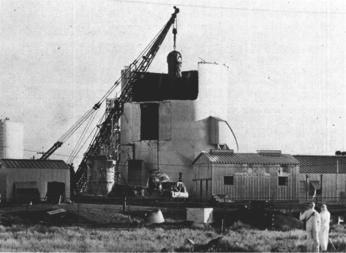Pentagon hands out contracts for PORTABLE nuclear reactors... yet another gold vein for cash-savvy military?

There's no shortage of hefty defense deals awarded by the US Department of Defense, but the $40 million contract for micro-reactors definitely stands out, as it hides safety risks and raises doubts over its economic efficiency.
The nuclear device that the DoD strategists want must have the capability to be safely and rapidly transported by road, rail, sea or air (sic!) as well as swiftly set up and shut down. The project split between three companies — BWX Technologies, Westinghouse Government Services and X-energy — calls for a "safe, mobile and advanced nuclear micro-reactor."
The safety part sounds particularly soothing, but how would it look on the ground? What if those miniature reactors, when moved by land, become targets of high-profile terrorist attacks? And will it prove to be a real alternative (which means cheaper price, of course) to conventional energy sources?
'The more reactors — the greater the danger'
"Any nuclear reactor attracts terrorists," Andrey Ozharovsky, nuclear scientist, program expert at the Russian Social Ecological Union, told RT. "It doesn't matter if it's located at a nuclear power plant [or inside a portable device]... if you remember, the terrorists planned directing one of the planes at a nuclear plant during 9/11."
The logic here is simple, he pointed out: "the more reactors are out there — the greater the danger." If the US builds hundreds, or even dozens of such devices, it'll be really hard for them to properly defend them all.
Also on rt.com German nuclear plants are vulnerable to terrorist attacks – studyAnother vital safety issue is the reliability of the nuclear micro-reactors. Interestingly enough, the US military had already experimented with them back in the 1950s and 1960s — and it ended in a tragedy.
Several portable reactors were built and setup in Greenland and Panama, but one of them blew up in 1961, killing three operators. The Army Nuclear Power Program was shut down shortly after that.

"There were eight US micro-reactors and one of them exploded. That's how safe they are," Ozharovsky said, adding that the Pentagon's idea of bringing them back will "likely create more risks instead of solving any problems."
'Micro-reactors yet to prove their economic efficiency'
But even if the portable reactors will be shielded from the perils of the battlefield and operate without failure, what's the Pentagon's rationale behind bringing the radioactive fuel to their military bases? For decades, the army had been successfully running on gasoline, diesel and fuel oil; when going off-grid, it would switch to generators and high-power accumulators.
"The main problem has nothing related to safety," Anton Khlopkov, director of Energy and Security Center and member of Russian Security Council's Scientific Council argued.
Micro-reactors must prove their viability from the economic point of view, since such plants always have alternatives.
It is yet to be proven that micro-reactors won't be "many times more" expensive than other conventional sources of energy. Electricity produced by such devices should be at least comparable in cost to the one produced by diesel generators, he said.
'Some kind of a soap bubble'
If micro-reactors are such a questionable solution, why is the Pentagon pushing for their development? The answer isn't lying on the surface, but it isn't buried too deep.
"They work against the trends," Ozharovsky suggested. And those trends are that the world is giving up on the use of civilian nuclear energy due to being too expensive.
Washington may be trying to "support the US the nuclear industry that's dying out with the use of the military budget; sponsor their research and development — which is an expensive thing."
Also on rt.com US plans to send nuclear reactors to spaceOzharovsky didn't rule out the possibility that the whole thing "is some kind of a soap bubble." The research will be made, some prototypes may even be put together, but no actual mini-reactors will be ordered by the Pentagon, he said.
The DoD's was never shy to spend the US taxpayer dollars: its F-35 program was worth a whopping $1.4 trillion in procurement and operating costs over its lifetime, while Pentagon also acquired such items of prime necessity as... $640 toilet seats and $7,600 coffee makers. The micro-reactors may well become another entry in this wasteful list.
Think your friends would be interested? Share this story!














